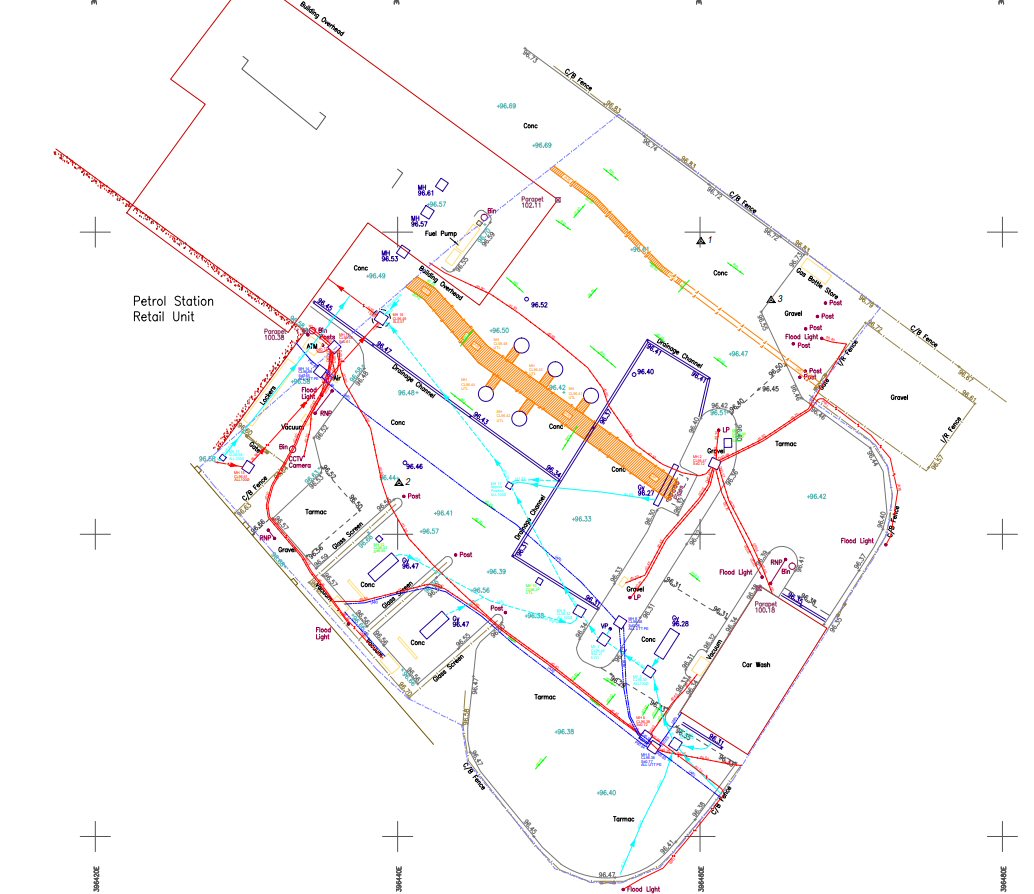
Electric vehicle charging infrastructure design and Survey requirements. London and South.
Cadmap Limited have been involved with over 250 Petrol Station sites for MFG Group and BP and recently some sainsbury's supermarkets. These surveys involve PAS128 Utility Mapping Surveys and Detailed Topographical surveys to create a detailed report of existing topographic details and buried services on the sites before any design or excavations can commence.
See below a typical utility and topographical survey for an Electric Vehicle charging point project. Charging point survey carried out in London.

The Survey above can give the design teams confidence in where to install the charging point station and how to connect power to the station into existing services detected on the PAS128 Survey.
We have carried out EV point petrol stations surveys all over the UK, London, Brighton, Manchester, Birmingham, Bristol, Portsmouth, Southampton, Liverpool and more, providing Utility Surveys and Topographical reports. We have recently started doing these surveys for supermarket car parks, such as Salisbury's supermarkets - utility mapping and Topographical
Please contact Cadmap Ltd if you require a reliable survey company to assist you with your EV charging design projects Company Email : info@cadmap.co.uk
Please see below some information regarding the charging points and the strategies and decisions made to install these.
Integrating electric vehicle (EV) charging points at traditional petrol stations is a concept that has been discussed and explored by various stakeholders in the automotive and energy industries. The idea is to provide a convenient solution for EV owners who may need to charge their vehicles during long journeys or when traditional charging infrastructure is not readily available. Here are some considerations and potential benefits associated with installing EV charging points at petrol stations:
Convenience for EV Owners:
- Petrol stations are often strategically located along major highways and in urban areas, making them convenient locations for EV owners to charge their vehicles during long trips or when they are away from home.
Increased Utilization of Existing Infrastructure:
- Utilizing existing petrol station infrastructure can expedite the expansion of the EV charging network without the need to build entirely new facilities. This can potentially reduce costs and accelerate the deployment of charging infrastructure.
Diversification of Services:
- Petrol stations could diversify their services by offering both traditional fuel and electric charging options. This diversification may also future-proof these stations against the growing trend toward electric mobility.
Potential for Cross-Industry Collaboration:
- Collaboration between petrol station operators and energy companies, as well as partnerships with EV manufacturers, can facilitate the integration of EV charging infrastructure at existing petrol stations.
Grid Capacity and Energy Supply:
- Ensuring adequate grid capacity and a reliable energy supply is crucial when integrating EV charging stations. Petrol stations would need to assess and possibly upgrade their electrical infrastructure to accommodate the additional load from charging EVs.
Regulatory and Permitting Considerations:
- Adherence to local regulations and obtaining necessary permits are essential steps in the installation of EV charging stations. This includes compliance with safety standards, environmental regulations, and land-use policies.
Customer Experience and Education:
- Providing a positive and user-friendly experience for EV owners is essential. Clear signage, easy-to-use charging infrastructure, and educating customers about the benefits of EVs and the charging process can contribute to a successful integration.
Payment and Billing Systems:
- Implementing efficient and secure payment and billing systems is crucial. This may involve integrating with existing fuel payment systems or adopting new methods such as contactless payments and mobile apps.
Technology Compatibility:
- Ensuring that the charging infrastructure is compatible with various EV models and charging standards is important for broad accessibility.








